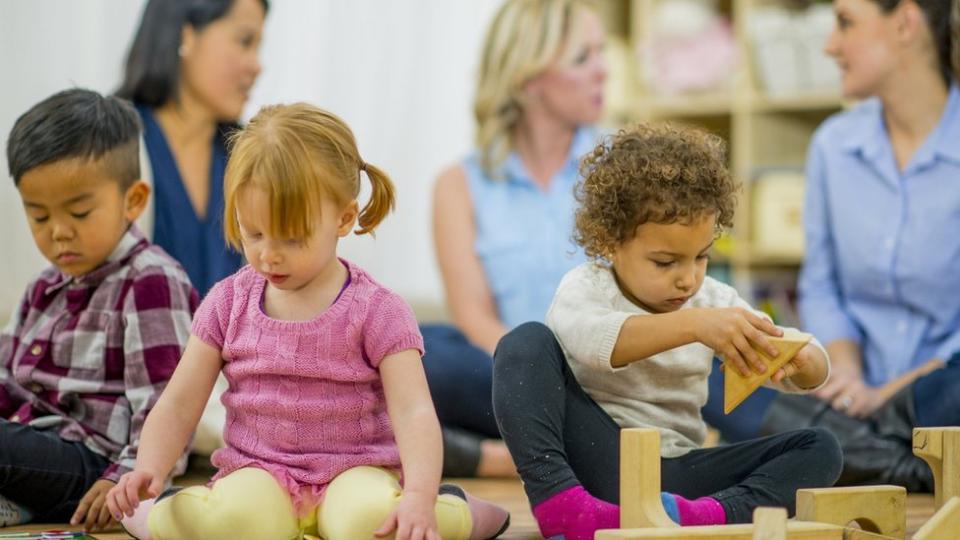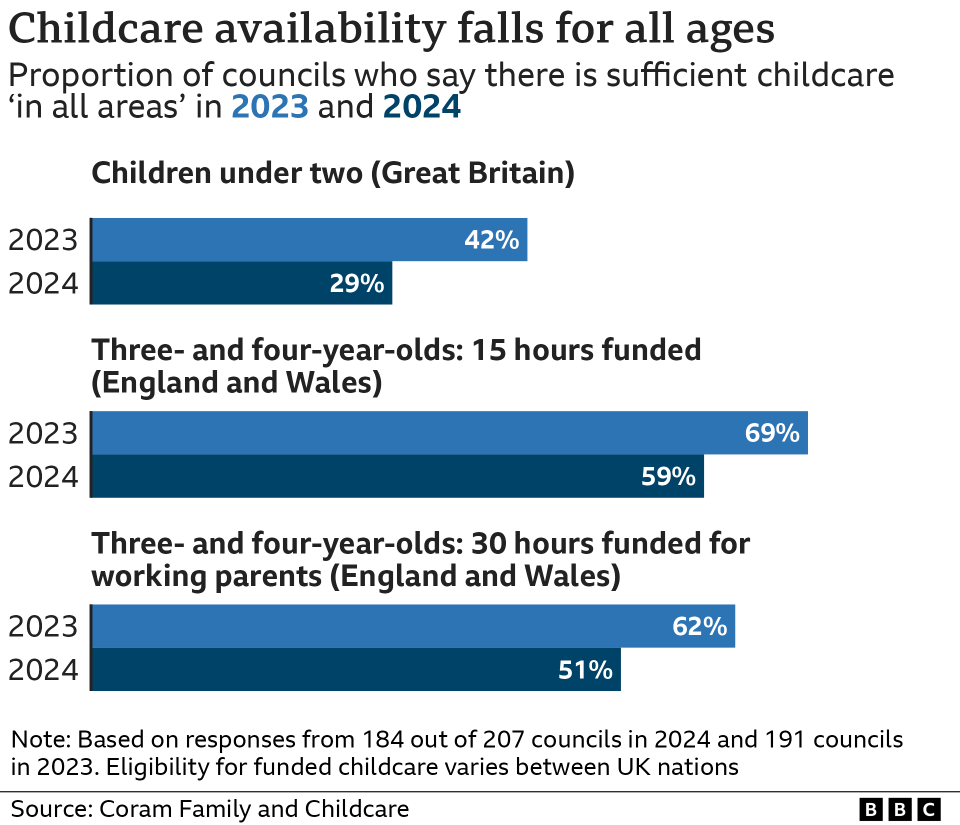How working parents can get 15 and 30 hours free childcare

Working parents of children from nine months old can now access 15 hours a week of free childcare.
The government hopes the scheme, which will expand to include all under-5s from late 2025, will help parents return to work.
However, critics say there are not enough places.
What free childcare can I get?
Extra help with childcare costs in England is being rolled out in stages. Some free hours were already available.
The help you can get depends on the age of your child, and whether you are working, or receiving certain benefits.
Working parents can get:
15 hours free childcare a week for two-year-olds from April 2024
15 hours free childcare for nine month olds from September 2024
30 hours free childcare for three and four-year-olds was already available
30 hours free childcare for all under-fives from September 2025
To qualify for the new hours, the majority of parents must earn more than £9,518, but less than £100,000 per year.
Those on certain benefits can already get:
If you do not work, you might still be eligible for 30 hours of free childcare if your partner works, or you receive certain benefits.
How do you apply for 15 or 30 hours free childcare?
Parents should apply before the start of the term when their child will be eligible.
You have to reconfirm your details every three months so if you do apply early, remember you will have to confirm your details have not changed before term begins.
The next term begins in January and parents of children from nine months old who are eligible for 15 or 30 hours can apply.
The government website has details of the deadlines to apply for each age group.

Once approved, you will get a code to give to your officially-registered childcare provider.
Free childcare hours are designed to be used over 38 weeks of the year - during school term time.
However, some providers will stretch them over 52 weeks if you use fewer hours per week.
What is not covered by the free childcare hours?
The government is increasing the hourly rate it pays childcare providers offering free hours.
However, in many cases, this rate does not cover the full cost of the childcare. So, some providers charge for extras like meals, nappies, sun cream or trips.
The Department for Education (DfE) said all additional costs are voluntary, and parents should be told they can supply their own food and supplies to make their childcare entirely free.
However, the charity Pregnant Then Screwed says its research found almost a quarter (23%) of parents said they couldn't afford to access free childcare hours because of top-up fees.
How expensive is UK childcare?
The average cost of full-time nursery (50 hours a week) for a child under two in Britain will be £15,709 across 2024, according to children's charity Coram, up from just under £15,000 in 2023.
Actual costs can vary significantly depending on where you live.
Coram's 2024 figure represents about 45% of average pay for a full-time worker in the UK.
Are there enough childcare places?
The Department for Education says an additional 35,000 staff and 70,000 places will be required to meet demand by September 2025.
According to Coram, the availability of nursery and childminder places has worsened for all ages of pre-school children across England, Scotland and Wales.
It says fewer than a third of councils (29%) have enough spaces for under-twos in 2024.

The government is offering a cash incentive of £600 to those who become childminders (or £1,200 for those joining via an agency).
The Department for Education does not yet have figures for the numbers who have signed up, but says childcare staffing rose by 4% across 2023 as a whole. However, the number of childminders - those providing early years care in homes - has continued to decrease.
It adds that while the latest Office for National Statistics data shows the total population of zero to five-year-olds has fallen 1% per year from 2018 to 2022, the number of childcare places increased by 40,000 between 2018 and 2023.
Education Secretary Bridget Phillipson said early years had been her "priority from day one", but nursery bosses said the government's updated funding rates for 2025 would not offset rising costs and could result in nursery closures.
What childcare help is available in Scotland, Wales and Northern Ireland?
Although all three and four-year-olds are entitled to some free childcare across the UK, different schemes operate in Scotland, Wales and Northern Ireland.
In each case, care must be delivered by officially registered providers.
How does tax-free childcare work?
Parents may be entitled to other support, including the UK-wide tax-free childcare scheme.
For every £8 you pay into an online childcare account, the government adds £2 (up to £2,000 per child per year, or £4,000 for disabled children).
Parents who qualify for free childcare hours can save in the tax-free scheme as well.
What other financial help can parents get for childcare costs?
The Care to Learn scheme offers further help to student parents who are under 20 at the start of their course.
The government has a childcare calculator to help compare available schemes.

Have you been able to access childcare spaces with funded hours available? Share your experiences by emailing haveyoursay@bbc.co.uk.
Please include a contact number if you are willing to speak to a BBC journalist. You can also get in touch in the following ways:
WhatsApp: +44 7756 165803
Tweet: @BBC_HaveYourSay
Please read our terms & conditions and privacy policy
If you are reading this page and can't see the form you will need to visit the mobile version of the BBC website to submit your question or comment or you can email us at HaveYourSay@bbc.co.uk. Please include your name, age and location with any submission.

 Yahoo Lifestyle
Yahoo Lifestyle 
